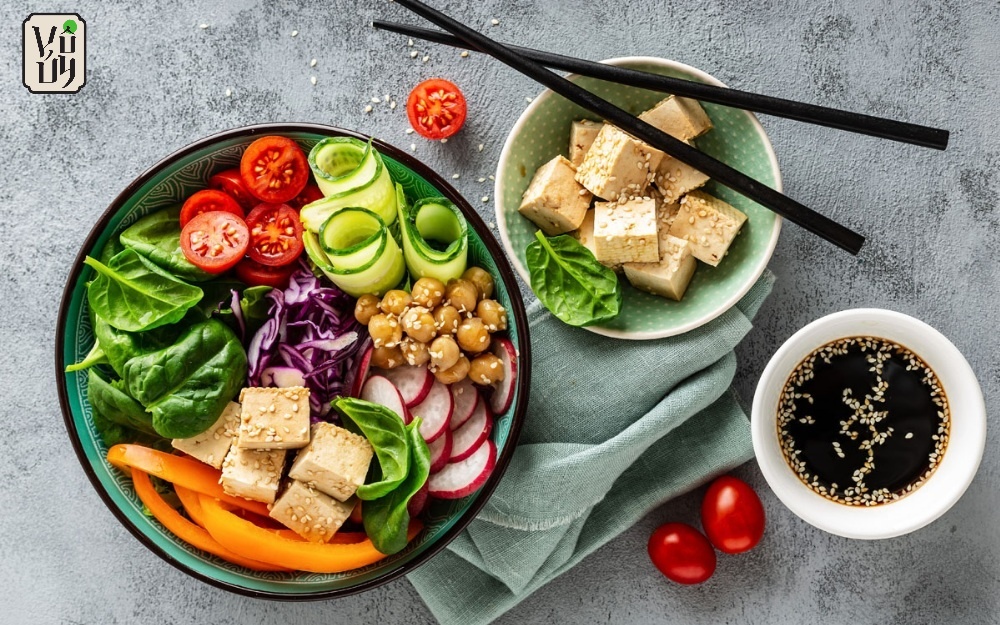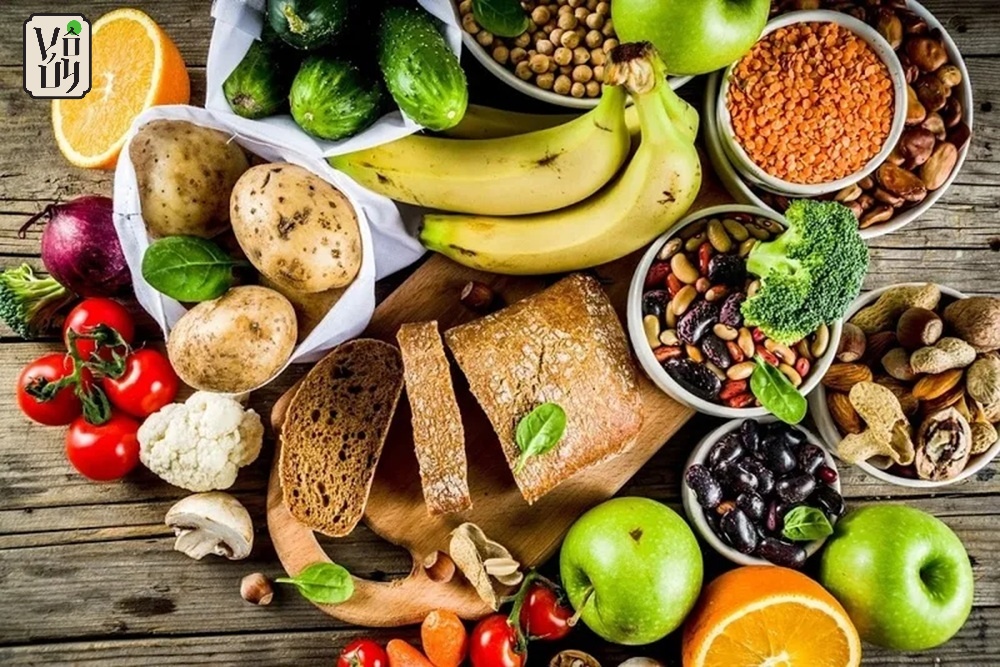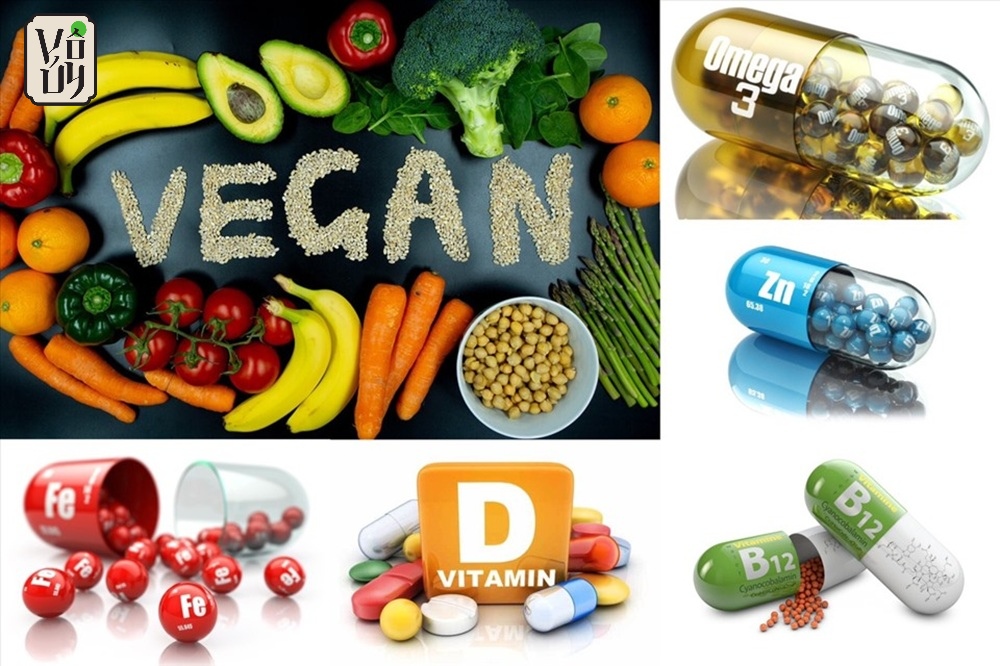Difference Between Long-Term Vegan Diet, Vegetarian, and Vegan
What is a long-term vegan diet? A long-term vegan diet is a plant-based eating pattern that excludes all animal products over an extended period—often for life. It offers many health, environmental, and spiritual benefits. However, following this diet incorrectly can lead to nutritional deficiencies. In this article, Vo Uy Vegan Restaurant will explain what a long-term vegan diet is, how it differs from vegetarianism and veganism, and how to adopt it in a healthy and sustainable way.
What Is a Long-Term Vegan Diet?
A long-term vegan diet refers to a sustained commitment to eliminating all animal-derived products, including meat, dairy, eggs, and honey. For many, this choice is rooted in religious beliefs (such as Buddhism or Jainism), environmental consciousness, or the desire for better health.
Unlike short-term or flexible vegetarian diets, a long-term vegan diet requires strong dedication and proper nutritional knowledge to maintain overall well-being.

What Is a Long-Term Vegan Diet?
More than just a diet, a long-term vegan diet is a conscious lifestyle choice. Many people embrace it not only for health reasons, but also for ethical and environmental values. Let’s explore this lifestyle in more detail.
The Difference Between Vegetarian, Vegan, and Long-Term Vegan Diets
To better understand, let’s distinguish between the following terms:
-
Vegetarian: A diet that excludes meat but may still include animal-based products like milk, eggs, or honey. This diet can be practiced flexibly, either on certain days or throughout the week.
-
Long-term vegan diet: A more consistent and long-term commitment to avoiding most, if not all, animal products. Some people may still consume dairy or eggs, depending on their individual approach and transition phase.
-
Vegan (strict veganism): Completely excludes all animal products in both food and lifestyle (clothing, cosmetics, etc.), often motivated by ethical and environmental concerns.

The Difference Between Vegetarian, Vegan, and Long-Term Vegan Diets
The Rise of the Long-Term Vegan Diet in Vietnam
In Vietnam, vegan and vegetarian lifestyles are becoming increasingly popular, especially due to the cultural influence of Buddhism and the global shift toward eco-conscious living. According to a 2024 survey, around 5% of Vietnamese people follow a plant-based diet, with numbers rapidly growing in major cities.
Vegan restaurants are flourishing in Hanoi, Ho Chi Minh City, and other urban areas, offering creative and nutritious plant-based meals to meet growing demand.
Health and Environmental Benefits of a Long-Term Vegan Diet
Is a long-term vegan diet healthy? Yes—when practiced correctly, it provides numerous health and environmental advantages.
Positive Effects on Health
A long-term vegan diet reduces bad cholesterol due to its low saturated fat content, supporting heart health. According to the American Heart Association, those who follow a vegan diet have a 20% lower risk of stroke. High fiber intake from vegetables also helps regulate blood sugar, reducing the risk of type 2 diabetes and colorectal cancer.
Environmental Benefits
Animal agriculture is a major contributor to carbon emissions and depletes natural resources such as water and land. By following a long-term vegan diet, individuals can significantly reduce their carbon footprint. The UN Environment Programme estimates that a vegan diet can cut carbon emissions by up to 50% compared to a meat-based diet.
Ethical and Spiritual Values
Choosing a long-term vegan diet reflects compassion and non-violence, aligning with Buddhist philosophy and moral values. Many people report a sense of inner peace, reduced stress, and improved mental clarity when committing to this lifestyle, enhancing their overall quality of life.

Health and Environmental Benefits of a Long-Term Vegan Diet
The Risks of Following a Long-Term Vegan Diet Incorrectly
While the long-term vegan diet is widely recognized for its benefits, following it improperly can lead to serious health issues.
Nutritional Deficiencies
A poorly planned vegan diet can lack essential nutrients such as protein, vitamin B12, iron, calcium, omega-3 fatty acids, and zinc. Without proper supplementation or a diverse food intake, symptoms like fatigue, anemia, memory loss, or bone weakness may develop—especially if the diet consists mostly of vegetables without variety.
Risks for Vulnerable Groups
Certain groups such as children, pregnant women, and the elderly require well-balanced nutrition for proper growth and health maintenance. People with chronic conditions like osteoporosis or anemia may face increased risks if they follow a long-term vegan diet without careful planning and medical guidance.

The Risks of Following a Long-Term Vegan Diet Incorrectly
Unwanted Weight Gain
Relying too heavily on processed vegan foods such as instant vegan noodles, mock meats, or deep-fried dishes can lead to weight gain. These products are often high in refined carbs, added sugars, and trans fats—reducing the overall health benefits of a long-term vegan diet.
Digestive Health Issues
Excess fiber intake from vegetables and whole grains can cause bloating and indigestion, especially in those with sensitive digestive systems. People with conditions like gastric ulcers should be cautious when consuming raw vegetables or gluten-containing grains, as they may aggravate symptoms.
Is a Long-Term Vegan Diet Good for You?
A long-term vegan diet can offer many benefits—but it also comes with challenges. Here’s an overall evaluation.
Overall Assessment
Is a long-term vegan diet good for your health? When practiced scientifically, this diet is excellent for cardiovascular health, digestion, and environmental sustainability. However, without proper knowledge or micronutrient supplementation, it may lead to health risks. According to Harvard Medical School, a well-balanced long-term vegan diet can increase life expectancy, but regular health checkups are essential.
Pros and Cons of a Long-Term Vegan Diet
| Criteria | Benefits | Risks |
|---|---|---|
| Health | Lowers cholesterol, supports heart and gut health | Deficiency in B12, iron, or calcium if not supplemented |
| Environment | Reduces emissions, conserves resources | Minimal environmental risks |
| Spirituality | Promotes compassion, inner peace | May not suit everyone’s beliefs or lifestyle |
How to Follow a Long-Term Vegan Diet Properly
To follow a long-term vegan diet the right way, you need a well-planned, balanced approach and should avoid common mistakes.
Ensure a Diverse Plant-Based Diet
Combine whole grains (like brown rice, quinoa), legumes (lentils, soybeans), seeds (chia, walnuts), vegetables, and fruits to meet your nutritional needs.
Sample meal plan:
-
Breakfast: Oatmeal with fortified soy milk
-
Lunch: Brown rice with tofu in tomato sauce
-
Dinner: Mushroom soup with a fresh vegetable salad
Supplement Essential Micronutrients
-
Vitamin B12: Use nutritional yeast, fortified plant-based milk, or supplements as prescribed by your doctor
-
Iron: Combine iron-rich foods like spinach or lentils with vitamin C sources such as oranges or bell peppers to enhance absorption
-
Omega-3 fatty acids: Include chia seeds, flaxseeds, or algae-based supplements as plant-based alternatives to fish oil

How to Follow a Long-Term Vegan Diet Properly
Limit Processed Vegan Foods
Packaged vegan products are often high in salt, sugar, and trans fats. Whenever possible, prepare meals at home or choose dishes from trusted vegan restaurants to ensure nutrient quality.
Get Regular Health Checkups
Have your blood tested every 6–12 months to monitor levels of vitamin B12, iron, calcium, and other key nutrients. This allows for timely dietary adjustments and helps reduce health risks over time.
Nutritional Meal Plan for a Long-Term Vegan Diet
A well-structured meal plan is essential for anyone following a long-term vegan diet to ensure sufficient energy intake and balanced nutrition. Here are some practical guidelines and suggestions.
Principles for Building a Vegan Meal Plan
Your daily meals should provide adequate protein, healthy fats, carbohydrates, and essential micronutrients. Focus on fresh, minimally processed ingredients to preserve nutrient content. Rotate your meals regularly to avoid boredom and ensure a variety of vitamins and minerals.
Sample One-Day Vegan Meal Plan
-
Breakfast: Avocado-banana smoothie with almond milk, whole grain toast with peanut butter
-
Lunch: Brown rice, tofu in tomato sauce, green salad with olive oil dressing
-
Dinner: Pumpkin soup, crispy fried tofu, and an apple for dessert
-
Snacks: A handful of walnuts and unsweetened soy milk
Tips for Long-Term Vegan Meal Planning
To maintain a long-term vegan diet in a sustainable and enjoyable way, creating a diverse and appealing menu is key. A great source of inspiration is visiting Vo Uy Vegan Restaurant, where you can explore creative dishes like avocado rice rolls with teriyaki sauce, refreshing veggie wraps, and savory braised plant-based specialties. These meals not only taste delicious but also spark ideas for your own home cooking.
Plan your weekly menu by alternating ingredients such as leafy greens, legumes, and seeds. For example:
-
Monday: Brown rice with lentils
-
Wednesday: Green salad with chia seeds
This diversity ensures you receive enough protein, vitamins, and minerals, while keeping meals exciting.
In addition, exploring trustworthy vegan recipes is a great way to refresh your meal ideas. You can check out cooking guides on the Vo Uy Vegan Restaurant website or reputable vegan blogs. These recipes are often simple, tasty, and help you stay motivated on your long-term vegan journey.

Nutritional Meal Plan for a Long-Term Vegan Diet
Frequently Asked Questions About Long-Term Veganism
What is long-term veganism and how is it different from a regular vegetarian diet?
Long-term veganism is a sustained commitment to eliminating all or most animal-based products, while a regular vegetarian diet may be more flexible—sometimes seasonal or only partially excluding animal products.
Is long-term veganism good for you?
Yes, when done properly, it supports heart health, digestion, and even helps the planet. However, it’s crucial to supplement with essential nutrients and monitor your health regularly.
How to avoid nutritional deficiencies on a long-term vegan diet?
Supplement with vitamin B12, iron, and omega-3 from sources like nutritional yeast, chia seeds, or doctor-prescribed vitamins. A varied and balanced diet is key.
Can long-term veganism help with weight loss?
Yes, especially if your diet includes low-calorie, high-fiber whole foods and avoids heavily processed vegan products. A well-planned vegan menu can support healthy weight management.
Is it safe for children to follow a long-term vegan diet?
Generally not recommended without medical supervision, as children need a wide range of nutrients for growth. If considered, consult a doctor or dietitian for proper supplementation.
Does long-term veganism affect muscle strength?
No—adequate protein from beans, legumes, seeds, and grains can help maintain muscle mass. Many vegan athletes still build strength effectively on a plant-based diet.
Is long-term veganism right for you?
It offers major benefits like better health, environmental impact reduction, and spiritual nourishment. However, it requires mindful nutrition planning to avoid deficiencies. Start with 1–2 vegan days a week and schedule regular health checks.
Ready to give it a try? Visit Vo Uy Vegan Restaurant and enjoy creative plant-based dishes!
Table reservations:
- Address: 47 Street No.3, CityLand Park Hills, Ward 10, Go Vap District, HCMC
- Website: https://nhahangvouy.com/
- Fanpage: facebook.com/nhahangchayvouy
- Google Maps: Link Google Maps


 0902 353 527
0902 353 527  cskh@nhahangvouy.com
cskh@nhahangvouy.com 

